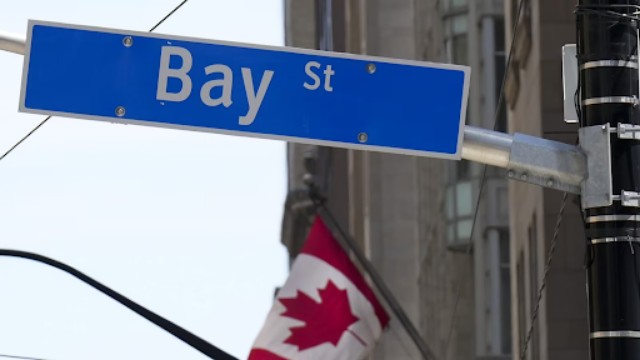
A view of Toronto’s Bay Street Financial District with the Canadian flag visible, captured on Friday, August 5, 2022. Photo credit: Nathan Denette / The Canadian Press
Stock markets across North America saw a sharp rebound on Wednesday after U.S. President Donald Trump announced a 90-day pause on most of his “reciprocal” tariffs, easing fears of a deepening global trade war. However, the relief came with a caveat—tariffs on Chinese goods were increased significantly, adding tension to an already strained economic relationship.
Trump announced a social media post, stating that most countries would receive a temporary break from the trade penalties he had imposed. While the baseline 10% tariff remains, the bulk of planned increases have been put on hold. Notably, China was excluded from this pause, with Trump immediately raising tariffs on Chinese imports to a steep 125%.
Financial experts say the decision brings temporary calm but not lasting clarity. Kevin Headland, chief investment strategist at Manulife Investment Management, shared his concerns: “This doesn’t reduce the uncertainty. It just postpones it.”
Despite this lingering doubt, investor sentiment appeared to shift quickly. Canada’s S&P/TSX composite index closed with a hefty gain of 1,220 points, up 5.4%, finishing at 23,727.03. Earlier in the day, markets had dipped due to growing fears that the tariff battle could spark a recession.
In the U.S., the reaction was even stronger. The Dow Jones Industrial Average soared by 2,963 points, ending the day up 7.9% at 40,608.45. The S&P 500 jumped 474 points, a 9.5% surge, marking its third-best performance day since World War II. The tech-heavy Nasdaq also spiked, gaining 1,857 points, or 12.2%, to close at 17,124.97.
These rallies come after four consecutive days of market losses, triggered by last week’s announcement of sweeping tariffs. The pause gave investors a reason to buy again, even as uncertainty lingered in the background.
Headland pointed out that volatility like this could eventually affect economic data and corporate performance. “The concern is whether this instability spreads into the real economy,” he noted. “That’s what investors are watching closely.”
Adding to the market’s cautious tone, some American companies are already adjusting. Delta Air Lines, for example, held back from offering future projections during its latest report. With U.S. earnings season beginning this week, investors are bracing for more companies to do the same.
Meanwhile, other financial indicators followed suit. The Canadian dollar climbed to 70.67 cents U.S. from 70.44 the previous day. Oil prices also rose, with crude up $2.77 to $62.35 per barrel. Natural gas increased by 35 cents to $3.82 per MMBtu. Precious metals joined the upward swing, with gold up $89.20 to $3,079.40 an ounce and copper edging up to $4.19 per pound.
As markets breathe a temporary sigh of relief, the real test will come when the 90-day window closes—and what decisions follow next.















